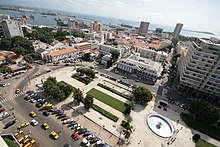Economy of Senegal

Dakar, Senegal's place de l'Indépendance: a center of government, banking and trade. In the background is the commercial port and the tourist area, Gorée island.
|
|
| Statistics | |
|---|---|
| 147th (2017) | |
|
All values, unless otherwise stated, are in US dollars. |
|
Predominantly rural, and with limited natural resources, the Economy of Senegal gains most of its foreign exchange from fish, phosphates, groundnuts, tourism, and services. The agricultural sector of Senegal is highly vulnerable to variations in rainfall and changes in world commodity prices. The former capital of French West Africa, is also home to banks and other institutions which serve all of Francophone West Africa, and is a hub for shipping and transport in the region.
Senegal also has one of the best developed tourist industries in Africa. Senegal depends heavily on foreign assistance, which in 2000 represented about 32% of overall government spending—including both current expenditures and capital investments—or CFA 270.8 billion (U.S$. 361.0 million). Senegal is a member of the World Trade Organization.
The GDP per capita of Senegal shrank by 1.30% in the 60s. However, it registered a peak growth of 158% in the 70s, and still expanded 43% in the turbulent 1980s. However, this proved unsustainable and the economy consequently shrank by 40% in the 90s.
Since the January 1994 CFA franc devaluation, the International Monetary Fund (IMF), the World Bank, and other multilateral and creditors have been supporting the Government of Senegal’s structural and sectoral adjustment programs. The broad objectives of the program have been to facilitate growth and development by reducing the role of government in the economy, improving public sector management, enhancing incentives for the private sector, and reducing poverty.
In January 1994, Senegal undertook a radical economic reform program at the behest of the international donor community. This reform began with a 50% devaluation of Senegal's currency, the CFA franc, which was linked at a fixed rate to the French franc. Government price controls and subsidies have been steadily dismantled as another economic reform.
...
Wikipedia
